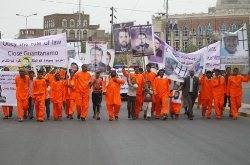The Obama administration has publicly identified for the first time 46 prisoners at the Guantanamo Bay US Naval Base whom it wants to hold indefinitely without charge or trial because it says they are “too dangerous to release but cannot be prosecuted”.
The Defense Department released the names on Monday after the Miami Herald newspaper and a group of Yale Law School students sued for its release in a US District Court in Washington.
The list also names nearly two dozen prisoners who have been recommended for prosecution, including Khalid Sheikh Mohammed, who is already on trial for his alleged role in the September 11, 2011, attack, and Hambali, an alleged Indonesian "terrorist leader".
Those on the list are prisoners who have been held without charge under the Authorized Use of Military Force act passed by Congress and signed by President George Bush in 2001, according to a spokesman for the Pentagon, Army Lieutenant-Colonel Todd Breasseale.
The prisoners on the list were first reviewed by an administration task force of lawyers, military officers and intelligence agents.
Indefinite detainees
In a 2010 report, the task force declared 48 Guantanamo prisoners “too dangerous to release”. However, the report said they could not be tried, either because there was no evidence linking them to specific attacks or because evidence against them was tainted by coercion or abuse.
On the list were 26 Yemenis, 12 Afghans, three Saudis, two Kuwaitis, two Libyans, a Kenyan, a Moroccan and a Somali.
Two of the Afghans died after the list was compiled, one from suicide and the other from a heart attack.
That leaves 46 of the 166 Guantanamo prisoners designated as indefinite detainees.
The Guantanamo detention camp was set up in 2002 to hold prisoners captured in US “counterterrorism operations” overseas.
President Barack Obama recently called it a stain on America's reputation and reiterated his intent to close it.
He said his administration would appoint a pair of envoys from the State and Defense departments to work on that.
Following up on that promise, the State Department announced on Monday the appointment of Clifford Sloan, a veteran Washington lawyer, to work as its envoy to negotiate the repatriation or resettlement of 86 prisoners who have been cleared for transfer or release.
Pre-trial hearings
The announcement came as five prisoners charged with plotting the 9/11 attacks on the US appeared in the war crimes tribunal at the Guantanamo base for a week of pre-trial hearings.
Defendants in the death penalty case include Khalid Sheikh Mohammed and four other men accused of funding and training the hijackers.
All five defendants appeared adequately fed, suggesting they have not joined more than 100 other detainees who have waged a four-month hunger strike in protest at the failure to resolve their fate after more than a decade of detention at Guantanamo.
They sat quietly in the courtroom as their lawyers questioned a retired admiral who previously oversaw the Guantanamo war crimes tribunal.
The lengthy and at times tedious questioning was aimed at showing the admiral and other military officials meddled in attorney-client communications, which are supposed to be confidential.
Hidden microphones
The hearing was the first in the case since February, when camp officials revealed that what appeared to be smoke alarms in the huts where defense lawyers met the defendants were actually microphones.
Camp officials insisted that they never listened to or recorded attorney-client meetings at the detention camp and said the microphones have since been disabled.
In addition to the five defendants in the 9/11 case, the Obama administration had planned to try about 36 prisoners in the war crimes tribunal.
But the chief prosecutor in the tribunals, Army Brigadier-General Mark Martins, told Reuters news agency last week that number would be scaled back to about 20 - including the 9/11 defendants and seven cases that have already been completed.
He had planned to charge many of the others with “providing material support for terrorism” but a US appeals court ruled last year that was not internationally recognized as a war crime when the acts in question took place in the late 1990s and early 2000s.
PHOTO CAPTION
Relatives of Yemeni detainees in Guantanamo Bay prison and human rights activists demonstrate for the release of the detainees, outside the U.S. embassy in Sanaa June 17, 2013.
Al-Jazeera


 Home
Home Discover Islam
Discover Islam Quran Recitations
Quran Recitations Lectures
Lectures
 Fatwa
Fatwa Articles
Articles Fiqh
Fiqh E-Books
E-Books Boys & Girls
Boys & Girls  Hajj Rulings
Hajj Rulings Hajj Fatwas
Hajj Fatwas














